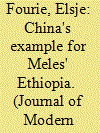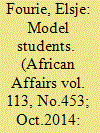| Srl | Item |
| 1 |
ID:
142546


|
|
|
|
|
| Summary/Abstract |
The past decade has seen the rapid rise of concepts such as the ‘China Model’ and the ‘Beijing Consensus’, yet more recent trends suggest a waning of their popularity. This article finds that the problem with the literature on the China model lies less with the concept itself than with a tendency to apply the term in an atheoretical and unempirical manner. From 2005 until at least 2012, Ethiopian elites from the upper echelons downwards were indeed engaged in a conscious and voluntary attempt to emulate aspects of China's perceived developmental successes. Drawing on interviews with 46 such elites, as well as on theories of lesson-drawing and cross-societal emulation, the study suggests that China may act as an example to countries seeking to achieve rapid modernisation and to navigate the perilous waters of political and economic globalisation. It is only by historicising and contextualising the ‘China Model’ within the older story of selective incorporation by certain ‘latecomer’ countries, however, that its true influence – and limits – can be understood.
|
|
|
|
|
|
|
|
|
|
|
|
|
|
|
|
| 2 |
ID:
134348


|
|
|
|
|
| Summary/Abstract |
Contemporary scholarship on policy making in Africa tends either to view the process as being entirely divorced from international policy lessons and experiences, or to portray policy makers as prone to unreflective imitation of whichever countries happen to be economically and politically ascendant. Kenya's Vision 2030 demonstrates both of these assumptions to be flawed: not only have Kenyan planners and technocrats consciously emulated foreign models in the formulation and execution of this long-term development plan, but the way in which they have done this is embedded in a historical reading of Kenya's development trajectory as well as the trajectories of those countries from which lessons are drawn. Thus, Vision 2030 bears the imprint of Singaporean and Malaysian policies, rather than only the more modish “Chinese Model”. Far from heralding the birth of an entirely new East Asia-inspired development paradigm, this emulation echoes the early years of post-colonial Kenya, when technologically optimistic planners such as Tom Mboya sought to guide the country along the path of modernization, deploying tools such as technocratic rule, rapid economic growth, and social engineering. The Kenyan case therefore demonstrates processes of policy emulation in Africa to be both more prevalent and more nuanced than is commonly assumed.
|
|
|
|
|
|
|
|
|
|
|
|
|
|
|
|